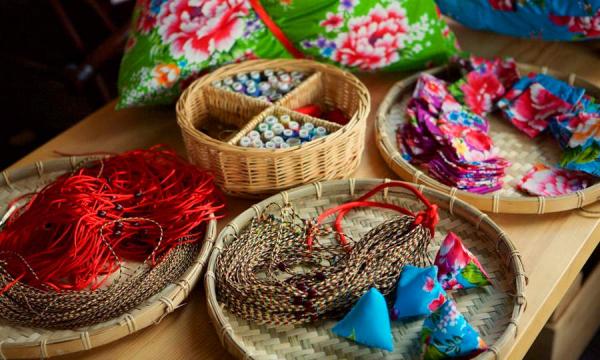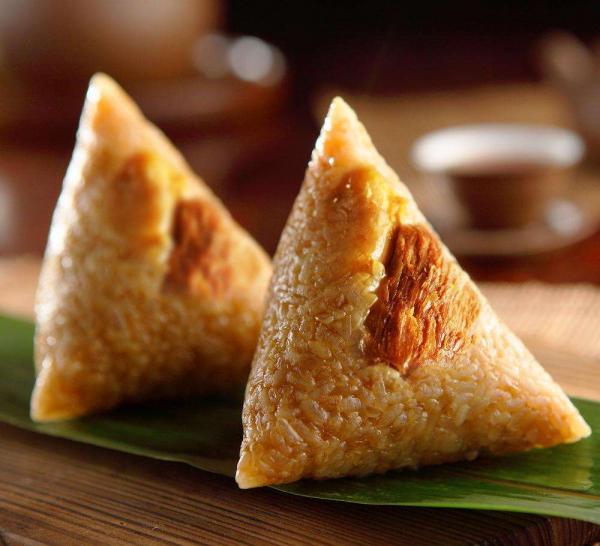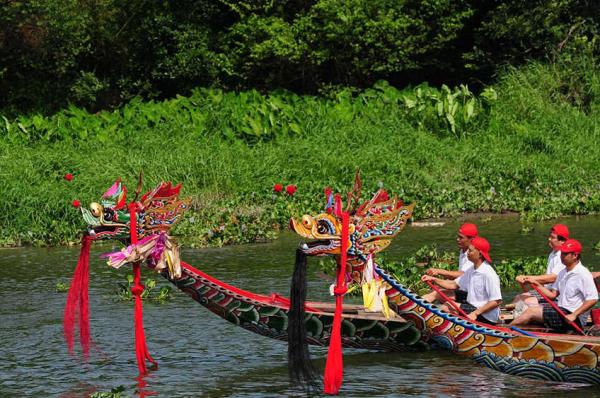The Dragon Boat Festival (Duanwu Festival)
The Dragon Boat Festival or Chinese Zongzi Festival (literally Duanwu Festival (端午节) in Chinese) is one of the most important traditional festivals in China and falls on the 5th day of the 5th lunar month in Chinese calendar every year. According the legend, the festival has been celebrated for over 2,000 years.
The Dragon Boat Festival has a wide influence in the world. The festival customs and traditions has spreaded to South Korea, Japan, Singapore, Vietnam, Malaysia, the United States, Germany, Britain and some other countries and places. In September 2009, UNESCO officially approved its inclusion in the representative list of intangible cultural heritage of mankind, so the Dragon Boat Festival became the first Chinese festival to be included in world heritage list.

The Dragon Boat Festival Facts
The Date of Dragon Boat Festival 2025
| Year | Date | Day | Holiday |
|---|---|---|---|
| 2026 | June 19 | Friday | Jun 19th – 21th |
| 2025 | May 31th | Saturday | May 31th – June 2nd |
| 2024 | June 10 | Monday | Jun 8th – 10th |
| 2023 | June 22 | Thursday | Jun 22nd – 24th |
Origin of Dragon Boat Festival
There are many stories about the origin of Dragon Boat Festival, but the widely accepted version told a sad story about Quyuan at conflicted Warring States (475 BC - 221 BC). He was a poet and the prime minister of Chu State at that time, highly esteemed by his wisdom and loyalty that brought peace and prosperity to the kingdom.
He knew the dangers that Qin state posed on its country and advised the King. But most officials were jealous of him and dissuaded the king from taking Qu Yuan's advice and exiled him for 20 years. Qu Yuan was desperate and helpless to watch his country into decline, when the capital was stormed by troops from Qin. He wrote "Lisao" or named the Lament, a greatest poem in Chinese literature history.

One the fifth day of the fifth lunar month, Quyuan drown himself in the Milo River in great pain, out of the desperation about his motherland's future. Nearby fishermen rushed over and tried to save him, but they were unable even to recover his body. People of Chu grieved and threw rice into the river to feed his hungry ghost. Zongzi was advised by the spirit of Qu Yuan, to wrap the rice in silk and bind it with five different colored threads as his spirit appeared at the mourners' dream and told the reptile in river stole the rice been offered.
And then Zongzi was offered through years while the dragon-boat races represented the attempts to rescue and recover the body of Qu Yuan, who is remembered for his love and loyalty to his country and people.
History of Dragon Boat Festival in china - How and When Did It Start
Prehistoric cultures such as the Hemudu ruins show that as early as 7,000 years ago or earlier, there were canoes and paddles used in the race. Recent excavated artifacts and archaeological studies show that the Baiyue ancestors took the dragon as a totem, and at that time the Dragon Boat Festival was a festival to worship the dragon ancestor.
In the pre-Qin period, the custom of the Dragon Boat Festival was mainly to avoid evil spirits. During the Spring and Autumn and Warring States Periods, May 5th had gradually become a special festival. After the unification of the Qin Dynasty, the customary activities on the fifth of May began to increase in large numbers.
During the Han Dynasty, activities such as tying colorful ropes and eating zongzi gradually became popular during the Dragon Boat Festival. During the Wei, Jin, Northern and Southern Dynasties, wars were frequent. In some places, the most valued custom of the Dragon Boat Festival was "Bi Bing Zeng". The Duanwu Festival during the Sui Dynasty and Tang Dynasty mostly evolved into recreational activities.
In the Song Dynasty, during the Duanwu Festival, there were also the rituals of worshipping heaven, the custom of shooting willows and the recreational activities of hitting the ball. Later in the Ming and Qing dynasties, the scale of celebrating the Dragon Boat Festival was getting larger and larger, especially the dragon boat races in the south.
Why It Was So Named
The “Duanwu Festival” was first mentioned in Zhou Chu's “Record of Customs and Land” in the Jin Dynasty, which reads, “At the Duanwu Festival in midsummer, corn is cooked.” The character "端" means "initial", so "端五" is the same as "初五" - the first five. According to the calendar, May is the "Wu" month, so the festival gradually evolved into "Duanwu Festival".
Dragon boat racing is an important activity of the Duanwu Festival, so it is also known as the Dragon Boat Festival.
Activities & Traditions - How People Celebrate Dragon Boat Festival in China
The Duanwu Festival was noted for its two most important activities, racing dragon boats and eating Zongzi. But there are also other traditions and customs to celebrate the Dragon Boat Festival in China.
Race Dragon Boat
Dragon Boat races are the most exciting part of the festival, common at the southern part of China, where has many lakes and rivers. The boat is in shaped of an open - mouth dragon, and brightly painted in red, yellow, white and black. With a length over 40 feet, it can hold dozens of boatmen. During the competition, Boatmen row the boat in cadence with the drumbeats, as the captain standing in the bow of the boat waves a small flag to help coordinate the rowing. The boat racing is very spectacular with drums beating and colorful flags waving, thousands of people cheering for their team to grab the flag at the end of course. This race always takes place in Hong Kong, Guangzhou, and other southern provinces annually.

Eating Zongzi
Zongzi is a traditional Chinese food on Dragon Boat Day, a pyramid-shaped (sometimes four-sided with pointed, rounded ends) dumpling made of glutinous rice. It is wrapped in bamboo or reed leaves to give it a special flavor and tied together with string, varied greatly across China. Zongzi in Guangdong is made of sweet-tasting, with pork, walnut, bean and other salty fillings; In Sichuan Province, Zongzi is usually served with a sugar dressing. Most Chinese people still maintain the tradition of eating Zongzi on Duanwu Festival but as to its popularity, Zongzi can be found all the year round in China.
Eating the Five Yellow Foods
There is a custom of eating "five yellow foods" during the Dragon Boat Festival in south China. "Five yellow" refers to eel, yellow croaker, cucumber, salted duck egg and realgar wine. It is also said that salted duck eggs can be substituted with soya beans. In the legend of Madam White Snake, lady white drinks realgar wine and shows the true shape of the snake body. So the people think that snake, scorpion, centipede and other poisonous insects can be driven away by realgar wine. Adults would drink some realgar wine on Dragon Boat Festival to exorcise evil detoxification, and keep healthy. According to the Chinese folklore, midday is the best time to eat five yellows so as to ward off poison and evil spirits.
Flying Kites
In the southern part of China, children fly kites on the Dragon Boat Festival. According to historical records, the tradition of kite flying began in the Southern Song Dynasty when people flew colorful kites on the Dragon Boat Festival, with the symbolism of praying for good luck and driving away disasters and evil spirits. Kites come in a variety of shapes, including dragons, phoenixes, cows, horses and so on. The most representative one is the dragon kite, because the dragon symbolizes power and good luck in Chinese culture.
Hanging Herbs
Usually, mugwort or calamus is tied into a bundle with red paper and then inserted or hung over the door. This is because calamus is considered to be the first of the five auspicious things in the sky, symbolizing the sword that drives away bad luck. Mugwort is considered to attract a hundred blessings and is a herb that can cure diseases. If inserted at the door, it can make people healthy.
Cuju (playing polo)
Cuju is a game of playing ball on a horse with a stick. The northern Chinese people did not have the custom of dragon boat racing at the Duanwu Festival. But they shot willow and cuju on this day.
Other Old Practice: Wear Colorful pouches
Ancient Chinese believed that the dragon boat day was unlucky as mid summer at the corner and hot weather then bring various disease, so dispelling disease and driving out evil were the main purpose. Children would wear necklaces or bracelets made of read, yellow threads, and hang and wear colorful pouches containing fragrant herbal medicines. Mother would always have the children bath in the water boiled with herbal medicines, which has been proved good things beneficial to health. But these old custom are not commonly observed and only available at rural areas.
Chinese Dragon Boat Festival Food
Zongzi and xionghuang wine are the most famous Dragon Boat Festival food. In addition, people in different parts of China also eat glutinous rice cake, sesame seed ball, moxa buns, oil cake, mung bean cake, etc.
Dragon Boat Festival around the World
In Korea: The Dragon Boat Festival was designated as an Oral and Intangible Heritage of Humanity on November 25, 2005 by the World UNESCO. It begins with the Daegwallyeong God Festival. Various witchcraft and ritual ceremonies are held during the event. Traditional games and experiential activities such as rope skipping and mask making are also held, as well as witchcraft performances, mask dances, and agricultural music performances.
In Japan: The Dragon Boat Festival was introduced to Japan from China after the Heian period. Before World War II, it was also a festival for boys. On this day, families with boys raise carp flags, eat zongzi and cypress leaf cakes to celebrate the festival. They also stick calamus under the eaves or put calamus in the water for bathing.
Singapore: Singaporeans also have the tradition of dragon boat racing and eating zongzi. The Nyonya zongzi is a unique festival delicacy in Singapore. >> Explore china tours from Singapore
In Vietnam: People prepare sticky rice with yellow ginger to thank their ancestors for their favors in bringing a bountiful life to their descendants and to pray for their blessings for a good harvest.


